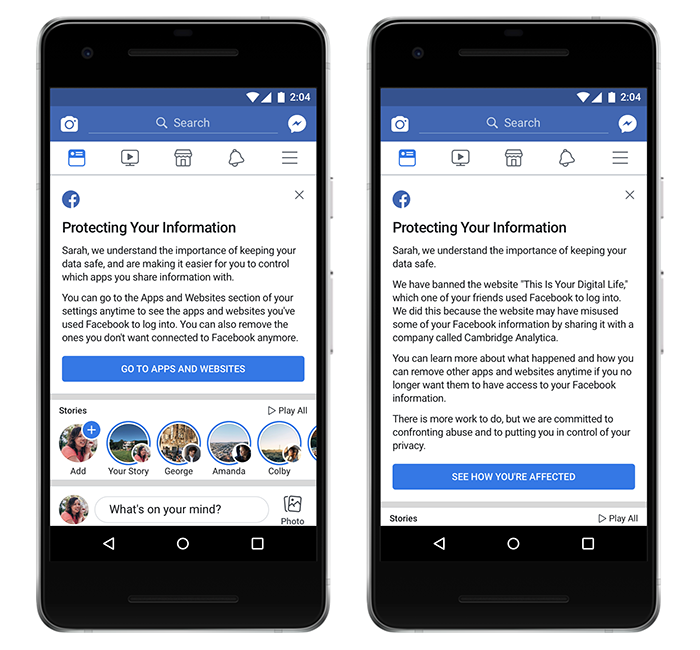Facebook is slated to push a message to users today to better inform them what apps they use and more importantly, what type of data they're sharing with the apps.
As part of the warning, which is scheduled to roll out to users at the top of news feeds at some point today, Facebook will also tell users whether their information was shared with Cambridge Analytica, the political consulting firm embroiled in last month's scandal.

"We have banned the website 'This Is Your Digital Life,' which one of your friends used Facebook to log into," the message reads. "You can learn more about what happened and how you can remove other apps and websites any time if you no longer want them to have access to your Facebook information."
If you haven't been keeping track, This Is Your Digital Life is the personality quiz app that 270,000 users of the site downloaded - something that siphoned up user data that was eventually handed off to Cambridge Analytica. The company said last week that approximately 87 million people - 70 million in the United States - had their personal information shared with the company. That number marked a spike from the 50 million users figure initially disclosed in a New York Times article on March 17.
Users can already go to the Apps and Websites section of Facebook's settings to see what companies they're sharing information with but Facebook hopes the pop up generates awareness around privacy for its users.
The alerts come just a few days after Facebook banned two other research companies from the platform, CubeYou, which apparently misused data from "non-profit academic research" personality quizzes filled out by Facebook users, and AggregateIQ, a Canadian election analytics firm that reportedly built tools for Cambridge Analytica.
Both pieces of news come in advance of the social media giant's scheduled Senate Committee hearing Tuesday. As part of the hearing Mark Zuckerberg, the embattled company's chairman and chief executive officer, is scheduled to testify in front of the Senate Committee on the Judiciary and Senate Committee on Commerce, Science, and Transportation in D.C.
Zuckerberg will follow up that hearing with another at the House Energy and Commerce Committee on Wednesday.
|
Blog Post What is a Phishing Attack? Defining and Identifying Different Types of Phishing Attacks |
EPIC, the Electronic Privacy Information Center, weighed in on the debacle on Monday by sending a letter to the Senate Committee on the Judiciary and the Senate Committee on Commerce.
The privacy watchdog urged the Senators on Tuesday to pay attention to the consent agreement package the Federal Trade Commission invoked on Facebook back in 2011 asking the company to "obtain consumers' express consent before their information is shared beyond the privacy settings they have established." That settlement came as a result of an eight-count complaint levied against the social media company at the beginning of the decade.
EPIC, along with several other non-profits, like the Center for Digital Democracy, U.S. PIRG, and the Consumer Federation of America, have called on the FTC to enforce the order in the past.
“The transfer of 87 million user records to Cambridge Analytica could have been avoided if the FTC had done its job. The 2011 Consent Order against Facebook was issued to protect the privacy of user data. If it had been enforced, there would be no need for the hearing this week,” the commission wrote. (.PDF)
